Marchés
Lors de la conception d’une intervention humanitaire et de la prise de décisions quant à l’utilisation des transferts monétaires, l’analyse générale des options de réponse doit inclure une analyse de marché. Il est prouvé qu’offrir un soutien ciblant le fonctionnement des marchés accélère la reprise et accroît la résilience dans les zones affectées par une catastrophe.
De nombreuses organisations ont investi dans la mise au point d’outils visant à faciliter l’analyse de marché et réfléchissent à la mise en place de programmes basés sur les marchés plus holistiques. Elles envisagent des interventions tirant profit du marché (basées notamment sur des transferts monétaires aux populations affectées), ainsi que des interventions soutenant directement les marchés (comme l’octroi de subventions conditionnelles aux vendeurs/euses pour la remise en condition du marché).
Initiatives associées
Contenu associé

1.2 Introduction à l’analyse de marché
Cours
Ce cours de 30 minutes offre une introduction à l’analyse de marché pour les contextes d’urgence. Il contient des contributions d'experts dans ce domaine. Ce cours a été développé en collaboration avec l'International Rescue Committee et le CALP Network et grâce au financement d’USAID/OFDA et de l’Agence Suisse pour le Développement et la Coopération. Il est destiné aux...

2.4 Un guide pratique pour l’analyse de marché
Cours
Ce cours en ligne de 3.5 heures vise à fournir aux équipes qui conduiront des analyses de marchés en contextes humanitaires une compréhension approfondie de la théorie et des étapes à suivre afin de leur permettre de comprendre le pourquoi et le comment du processus à suivre. Les participants seront guides à travers un scenario d'analyse de marchés d'urgence. Ce cours s'appuie sur...
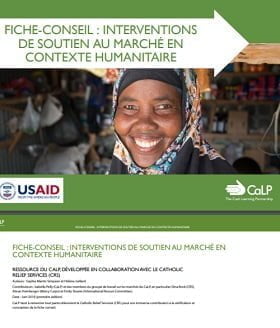
Fiche-Conseil : Interventions de soutien au marché en contexte humanitaire
Guides et outils
La fiche conseil définit le programme de soutien au marché en contexte humanitaire et le décrit dans la pratique. Elle permet aux praticiens humanitaires d’envisager systématiquement des interventions de soutien au marché, parallèlement à d’autres activités du programme. Le champ d’application comprend des interventions de soutien au marché axées sur l’offre/la disponibilité...
Thematic lead
Latest
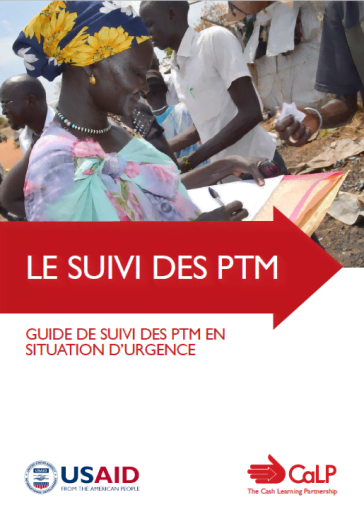
Le suivi des PTM : Guide de suivi des PTM en situation d’urgence
Guides et outils
Ce guide constitue une ressource centrale « évolutive « pour promouvoir une compréhension commune des considérations de suivi les plus importantes pour les projets humanitaires utilisant des programmes de transfert monétaire (PTM).
L’objectif du présent guide est d’aider les praticiens sur le...

Profiling of caseload in need of cash-based interventions Results
Report
At the request of the Inter Sector Working Group in Gaziantep, the Case Management Task Force and the Protection Working Group, the Cash-Based Interventions Technical Working Group (CBI TWG) produced this “Cash Gap Analysis”. The analysis aimed to profile the refugee population in Turkey who require...

Karamoja Market Assessment
Report
A market assessment of the feasibility of cash transfers in the Karamoja region – Executive summary
The effect of financial aid from UK Aid Girls’ Education South Sudan programme and EU IMPACT programme to education in South Sudan in 2017
Report
This paper is an update to the previous Girls’ Education South Sudan working paper that looked at the effect of financial interventions (capitation grants and girl’s cash transfers) by Girls’ Education South Sudan, a collaboration of UK Aid and the Ministry of General Education and Instruction,...
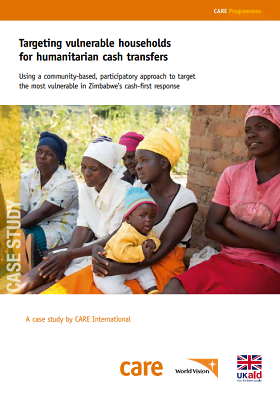
Targeting vulnerable households for humanitarian cash transfers: using a community based, participatory approach to target the most vulnerable in Zimbabwe’s cash-first response
Report
Over 73,000 drought affected households across 15 districts in Zimbabwe received monthly multi-purpose, unconditional cash transfers. With such a large caseload over a wide area, 100% verification of the households would not have been the most resource efficient approach. Moreover, there would have been a...

Exploitation des technologies numériques dans les transferts monétaires mis en oeuvre lors de la réponse à l’épidémie d’Ebola
Rapport
L’adoption des technologies numériques s’est accrue parallèlement à l’essor des transferts monétaires, souvent au moyen de transferts électroniques, car ces solutions présentent des avantages en matière de transparence et d’efficacité (gain de temps et d’argent). En 2015, le Haut Panel...
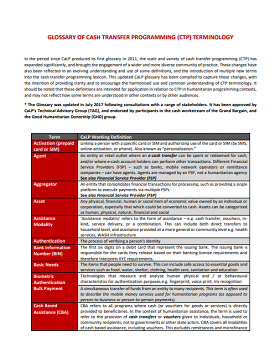
Glossary of Cash Transfer Programming (CTP) Terminology
Report
In the period since the CALP Network produced its first glossary in 2011, the scale and variety of cash transfer programming (CTP) has expanded significantly, and brought the engagement of a wider and more diverse community of practice. These changes have also been reflected in an evolving understanding...

White Paper on Cash Coordination
Report
As more agencies are using cash transfer programming in humanitarian contexts, the need for coordination has grown. Aid organizations have set up cash working groups in many emergency settings that often differ in terms of leadership and institutional setup. This ad hoc approach has helped provide...

Libya Humanitarian Cash Working Group (CWG) Key Messages
Report
The purpose of this document is to provide key messages of the Cash Working Group (CWG) that can be used in discussions with humanitarian stakeholders. This document is not designed to be passed to interlocutors, but rather inform CWG members on key points to raise in discussions.

The use of CTP in Kenya: Reflecting on the 2016/17 Drought Response
Report
This workshop report is packed with useful ideas and information, reflecting the lively discussions which took place at a workshop in June 2017 about the use of CTP in the Kenya drought response. Discussions touched on multiple issues including coordination; cash transfer values; lack of awareness...

Cash Transfer Programming: Lessons from northern Iraq
Report
In situations of conflict, disaster and protracted crisis, displaced persons not only face physical threats but are also confronted with the challenge of economic survival. High levels of general unemployment or legal barriers to labour market entry often restrict access to jobs and income, and...
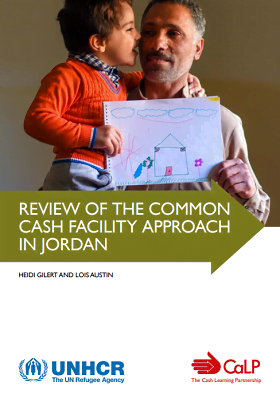
Review of the Common Cash Facility approach in Jordan
Report
The United Nations High Commissioner for Refugees (UNHCR) in Jordan has pioneered a collaborative, multi-stakeholder approach to the delivery of cash, known as the Common Cash Facility (CCF). The aim of the CCF is to provide humanitarian actors with direct and equal access to a common financial service...

Checking Back – Using Cash and Vouchers in Somalia: Recommendations from the 2011-12 Somalia Drought Response
Report
This paper brings together recommendations from some of the key reports and evaluations from the 2011 Somalia drought response. The process of preparing this paper involved reviewing 17 reports and identifying five that had recommendations which could be useful for all agencies involved the current...

Humanitarian Cash Transfers in the Democratic Republic of the Congo: Evidence from UNICEF’s ARCC II Programme
Report
From March 2013 to September 2015, UNICEF and three partner organizations (Concern Worldwide, Mercy Corps, and Solidarités International), collaborated to deliver what was at the time the single-largest unconditional cash transfer programme for humanitarian response in the Democratic Republic of the...

Community Based Targeting Report
Report
The current study aimed to gain a comprehensive understanding of SEV from the community’s perspective and to assess the targeting practices implemented by cash actors in Lebanon. It demonstrated that, according to the community, HH size had an impact on vulnerability, but that that depended on its...

Fitting aid to context: community experiences of aid delivery in northern Syria
Report
The ongoing conflict in Syria has left 13.5 million Syrians in need of humanitarian assistance. Several local and international organisations provide aid to northern Syria, but their chosen modalities fail to effectively meet community members’ needs. While aiming to respond to immediate short-term...
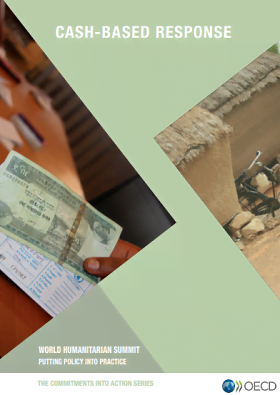
Cash-Based Response- OECD Commitments into Action Series
Report
The use of cash in humanitarian response is not new. What is new, notably after the World Humanitarian Summit and the Grand Bargain, is the policy momentum for using cash as a primary option in responding to humanitarian needs. There is a growing body of evidence demonstrating its multiple benefits as...

Guidance to Partners Funded by ECHO to Deliver Medium to Large-Scale Cash Transfers in the Framework of 2017 HIPs and ESOP
Guidelines and Tools
The use of multi-purpose cash transfers as a central component of humanitarian assistance is becoming increasingly important, in particular in the context of protracted crises in middle-income countries. Whilst an instrument such as the ESSN (Emergency Social Safety Net) in Turkey certainly represents an...

Using Cash and Vouchers in Somalia in 2017: The Need to Build on Learning from the 2011-12 Somalia Drought Response
Report
During the 2011-12 drought response in Somalia, cash and vouchers were distributed at scale – a response that was unusual in such a context at that time. In 2017 cash is accepted as highly appropriate and is a major part of response plans. While it may not always be possible to apply all best...
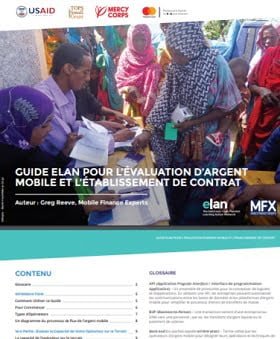
Guide ELAN pour l’évaluation d’argent mobile et l’établissement de contrat
Guides et outils
L’argent mobile offre le potentiel énorme de permettre des transferts d’argent liquide à l’échelle et de relier des participants de programme à des services financiers. Fréquemment, cependant, les professionnels humanitaires ont des difficultés à comprendre la terminologie liée à l’argent...
